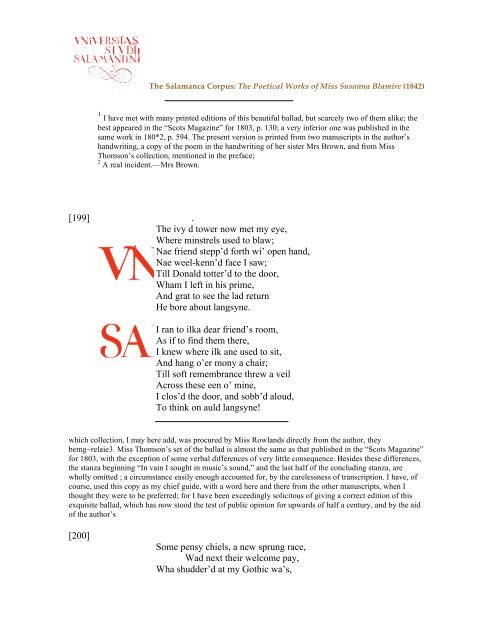The Poetical Works of Miss Susanna Blamire (1842) - Gredos ...
The Poetical Works of Miss Susanna Blamire (1842) - Gredos ...
The Poetical Works of Miss Susanna Blamire (1842) - Gredos ...
You also want an ePaper? Increase the reach of your titles
YUMPU automatically turns print PDFs into web optimized ePapers that Google loves.
<strong>The</strong> Salamanca Corpus: <strong>The</strong> <strong>Poetical</strong> <strong>Works</strong> <strong>of</strong> <strong>Miss</strong> <strong>Susanna</strong> <strong>Blamire</strong> (<strong>1842</strong>)<br />
1 I have met with many printed editions <strong>of</strong> this beautiful ballad, but scarcely two <strong>of</strong> them alike; the<br />
best appeared in the “Scots Magazine” for 1803, p. 130; a very inferior one was published in the<br />
same work in 180*2, p. 594. <strong>The</strong> present version is printed from two manuscripts in the author’s<br />
handwriting, a copy <strong>of</strong> the poem in the handwriting <strong>of</strong> her sister Mrs Brown, and from <strong>Miss</strong><br />
Thomson’s collection, mentioned in the preface;<br />
2 A real incident.—Mrs Brown.<br />
[199] .<br />
<strong>The</strong> ivy d tower now met my eye,<br />
Where minstrels used to blaw;<br />
Nae friend stepp’d forth wi’ open hand,<br />
Nae weel-kenn’d face I saw;<br />
Till Donald totter’d to the door,<br />
Wham I left in his prime,<br />
And grat to see the lad return<br />
He bore about langsyne.<br />
I ran to ilka dear friend’s room,<br />
As if to find them there,<br />
I knew where ilk ane used to sit,<br />
And hang o’er mony a chair;<br />
Till s<strong>of</strong>t remembrance threw a veil<br />
Across these een o’ mine,<br />
I clos’d the door, and sobb’d aloud,<br />
To think on auld langsyne!<br />
which collection, I may here add, was procured by <strong>Miss</strong> Rowlands directly from the author, they<br />
bemg~relaie3. <strong>Miss</strong> Thomson’s set <strong>of</strong> the ballad is almost the same as that published in the “Scots Magazine”<br />
for 1803, with the exception <strong>of</strong> some verbal differences <strong>of</strong> very little consequence. Besides these differences,<br />
the stanza beginning “In vain I sought in music’s sound,” and the last half <strong>of</strong> the concluding stanza, are<br />
wholly omitted ; a circumstance easily enough accounted for, by the carelessness <strong>of</strong> transcription. I have, <strong>of</strong><br />
course, used this copy as my chief guide, with a word here and there from the other manuscripts, when I<br />
thought they were to be preferred; for I have been exceedingly solicitous <strong>of</strong> giving a correct edition <strong>of</strong> this<br />
exquisite ballad, which has now stood the test <strong>of</strong> public opinion for upwards <strong>of</strong> half a century, and by the aid<br />
<strong>of</strong> the author’s<br />
[200]<br />
Some pensy chiels, a new sprung race,<br />
Wad next their welcome pay,<br />
Wha shudder’d at my Gothic wa’s,
















